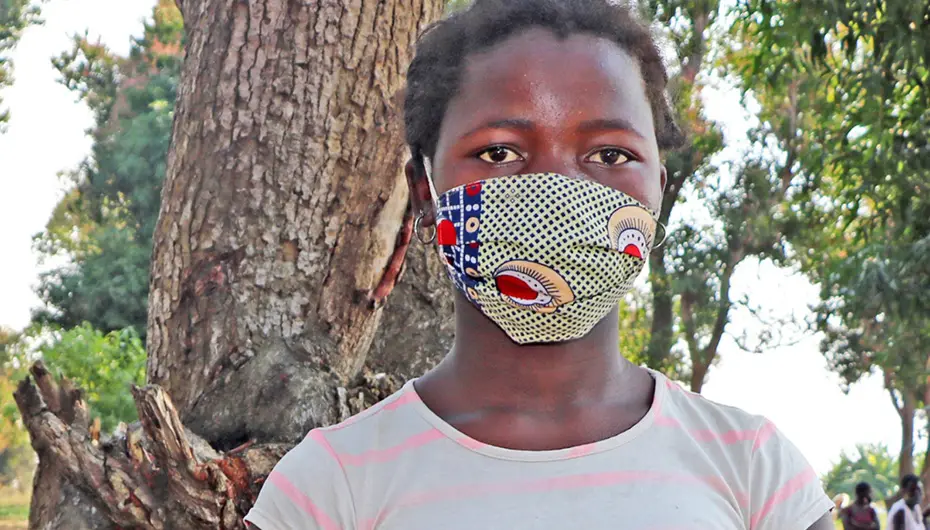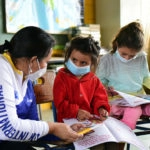Media Centre - Media release - 10 May 2021
Girls and young women name education as area of life most impacted by COVID-19

With the Australian Federal budget being handed down tomorrow, a report released today by Plan International shines a light on the urgent need to prioritise spending on girls’ education as part of the Government’s international COVID-19 response and recovery efforts.
The new report, Halting Lives 2 – In Their Own Voice calls on governments’ to urgently address financial barriers to girls attending school to limit the damage COVID-19 has caused to their education and future prospects.
Plan International Australia, the charity for girls’ equality, has also called on the Australian government to strengthen education systems in the Indo Pacific region by increasing its commitment to the Global Partnership for Education from $30m a year to $70m annually.
We know from recent research from the Gates Foundation that 25 years of progress on girls’ education globally has been set back by 25 years – that is a devastating blow,- said Susanne Legena, CEO of Plan International Australia.
“Investment in girls’ education globally is one of the single, most powerful interventions the Government can make to drive the COVID-19 response and recovery efforts in the Indo Pacific region,” she said.
The new Halting Lives research, carried out in 14 countries, finds that girls and young women around the world see education as the area of their life which has been most profoundly affected by the COVID-19 pandemic.
In a series of in-depth interviews, limited access to technology, insufficient support from schools and colleges and physical space to study at home were all named as difficulties they have faced while trying to learn remotely.
Loneliness and domestic responsibilities have also interfered with girls’ ability to keep up with distance learning while schools and colleges have remained closed, and impacted on girls’ ability to concentrate and focus when studying at home.
In the study, Halting Lives 2 – In Their Own Voice, students also cited a lack of money for data, mobile phones and other costs related to online learning, and not having anyone to help explain lessons or concepts, as frequent barriers to learning throughout the pandemic.
Emily, 17, from Ecuador, said: “The most difficult thing is the lack of internet … I used to use the neighbour’s internet, but I don’t know what happened and she cut off the internet even when my mother was helping her to pay the cost.”
A survey carried out by Plan International as part of the ongoing study last year found that 19% of girls worldwide believe that COVID-19 will force them to put their education on hold, while 7% fear they will have to drop out of school entirely.
School closures impacted up to 1.5 billion students at the height of the first wave of the pandemic last year, with closures in place in 194 countries across nearly all of Europe, Africa, Latin America and Asia[1].
Jacqui Gallinetti, Director of Monitoring, Evaluation, Research and Learning for Plan International, said: “COVID-19 has changed all of our lives profoundly over the last year. But its impact does not fall equally, and the pandemic has brought pre-existing inequalities sharply into focus, whether between rich and poor, young and old, male and female.
The future of girls and young women in many countries is very much in jeopardy, and government policies must acknowledge this as we emerge from the pandemic and adapt to a new normal, listening to the concerns they have raised. Otherwise, we risk a real setback to gender equalityThe study also found that the considerable disruption to girls’ and young women’s education over the last year, combined with fear of the virus itself and having to adapt to lockdown measures, has taken a toll on their mental health and many of the research participants struggled with stress and anxiety.
Michaela, 17, from the United States, said: “The way that everything’s structured is really hard and difficult. It’s like I think they’re trying to accommodate us, but they’re not really…
“I feel like they’re giving a lot more work than they used to when we were at school. Because they think that we have more time at home, which is not the case… a lot of my friends have siblings to take care of and all that stuff. We get a lot more work, and we have a lot more responsibilities… and it’s really overwhelming.”
Xiluva, 17, from Mozambique said: “I hope that we may return to classes; that there is no increase in cases of early marriages during the pandemic, because I think that during this period some girls will be subjected to early marriages, others will be pregnant.
“Because the girls are at home doing nothing, some family members do not accept that the girl does not contribute to food. They force the girl to go out to look for food; for parents, having a girl at home is a burden on their backs and to get rid of the weight they hand over their daughters to a man.”
Plan International is urging governments worldwide to fund and enable a safe return to school for all pupils, recognising that girls are at greater risk than boys of dropping out permanently.
The organisation is also calling for better training for both teachers and students in the use of technology, to improve the quality of remote learning in countries where schools remain closed and so that education is more resilient in the event of future crises.
This includes planning for future closures by identifying pupils who are most in need of support and investing in high-tech and low-tech methods, including radio, TV, and online learning, as well as distributing school kits with lesson plans, stationary and pens.
“There are ample opportunities in Australia’s aid budget to ensure that children, especially girls, can continue their education despite the significant disruption that COVID-19 continues to play,” said Susanne Legena, CEO of Plan International Australia.
For further comment, images and background please contact Plan International Australia media and ambassador manager James Norman on 0451291775 or public relations advisor Claire Knox on 0452326549
NOTES TO EDITORS
- Halting Lives 2 used qualitative research methodologies, conducting semi-structured in-depth interviews three times over a six-month period in 14 countries: Australia, Brazil, Ecuador, Egypt, Ethiopia, France, Ghana, India, Mozambique, Nicaragua, Spain, USA, Vietnam and Zambia. It is part of a study tracking the impact of the COVID-19 pandemic on girls and young women over the last year, including a survey of more than 7,000 girls in 14 countries.
- There were a total of 71 research participants, all of whom were female and aged between 15-24, drawn from Plan International’s programme participants.
About Plan International Australia
Put simply, we’re the charity for girls’ equality. We tackle the root causes of poverty, support communities through crisis, campaign for gender equality, and help governments do what’s right for children and particularly for girls. We believe a better world is possible. An equal world; a world where all children can live happy and healthy lives, and where girls can take their rightful place as equals.
About Plan International
Plan International is an independent development and humanitarian organisation that advances children’s rights and equality for girls.
We believe in the power and potential of every child. But this is often suppressed by poverty, violence, exclusion and discrimination. And it’s girls who are most affected. Working together with children, young people, our supporters and partners, we strive for a just world, tackling the root causes of the challenges facing girls and all vulnerable children.
We support children’s rights from birth until they reach adulthood. And we enable children to prepare for – and respond to – crises and adversity. We drive changes in practice and policy at local, national and global levels using our reach, experience and knowledge.
We have been building powerful partnerships for children for over 80 years and are now active in more than 75 countries.
Media contacts

